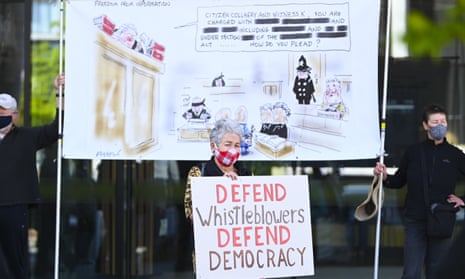Lawyers for the attorney general, Michaelia Cash, are arguing behind closed doors for suppressions on a judgment that overturned prior secrecy orders in the trial of the barrister Bernard Collaery.
The layer upon layer of secrecy in the case has prompted renewed criticism from human rights lawyers, who say the loss of open justice erodes public confidence.
Collaery, a lawyer and former Australian Capital Territory attorney general, is facing trial for allegedly disclosing intelligence information about a 2004 mission by Australia to bug its impoverished ally Timor-Leste during oil and gas negotiations. He and his client, the former intelligence officer Witness K, have been described as heroes of Timor-Leste for their actions, including by the former president Jose Ramos-Horta.
Last month Collaery won a major battle in the ACT court of appeal to remove secrecy orders shrouding significant parts of his prosecution from the public. In a summary of its decision, the court cited the importance of open justice in preventing “political prosecutions”.
“The court emphasised that the open hearing of criminal trials was important because it deterred political prosecutions, allowed the public to scrutinise the actions of prosecutors, and permitted the public to properly assess the conduct of the accused person,” the summary said.
Almost four weeks later, the court’s full judgment has still not been published.
On Tuesday Australia’s attorney general again intervened in the case, this time asking for significant parts of the judgment to be redacted, on grounds including national security.
Arguments for redactions took place briefly in open court. The court was then closed to the public and media to allow the attorney general, represented by Anna Mitchelmore SC, to fully make the case for suppressions.
A Human Rights Law Centre senior lawyer, Kieran Pender, said the court of appeal had already made clear that secrecy in the Collaery case erodes public confidence.
“The next step in this sorry saga should be to drop the charges altogether, not to argue for more secrecy, at a secret hearing, about a judgment that said no to a secret trial,” he said.
The federal government has until Wednesday to tell the court whether it will appeal against the ACT court of appeal’s ruling.
Guardian Australia has asked Cash’s office whether a decision to appeal has yet been made.
Collaery is facing five charges of disclosing protected intelligence information to ABC journalists and of conspiring with Witness K to communicate information to the Timor-Leste government.
The pair were helping Timor-Leste mount a case against Australia in the international courts, arguing that the Timor Sea agreement had been rendered void by Australia’s spying.
Australia’s domestic spy agency raided their homes in 2013. Witness K’s passport was seized, preventing him from travelling to The Hague to give evidence.
After Timor-Leste and Australia reached a new agreement on the Timor Sea, the Australian government signed off on a prosecution of Collaery and Witness K.
